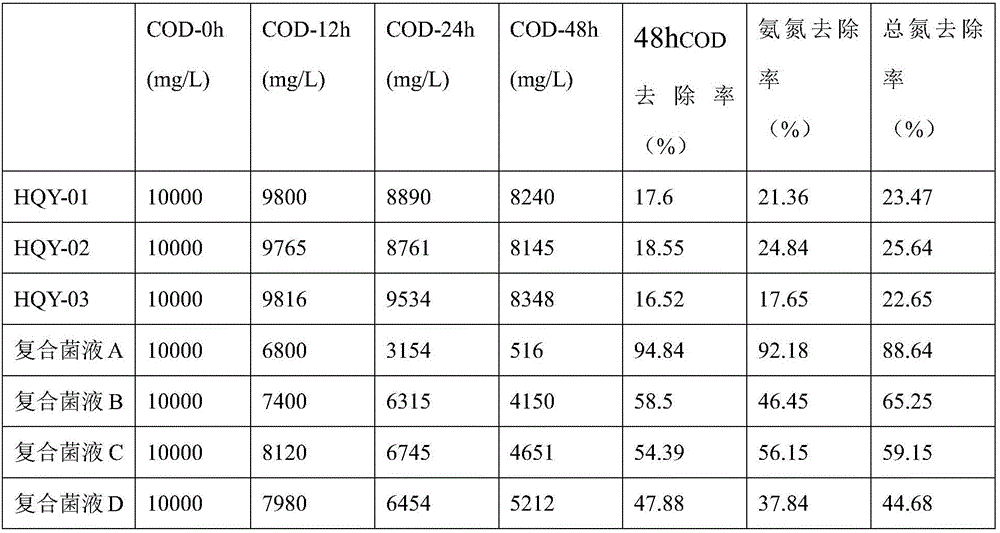Kitchen waste degrading compound bacterium and application thereof
A technology of kitchen waste and compound bacteria, which is applied to bacteria, microorganisms, biochemical equipment and methods, etc., can solve the problems of poor biochemical treatment effect of kitchen waste, and achieve the effect of high waste reduction rate and safe and convenient use.
- Summary
- Abstract
- Description
- Claims
- Application Information
AI Technical Summary
Problems solved by technology
Method used
Image
Examples
Embodiment 1
[0026] Strain screening and identification
[0027] (1) Strain screening: use selective medium to screen strains in food waste reactors;
[0028] (2) Re-screening of bacterial strains: screening of high-efficiency bacteria for the single strains screened;
[0029] (3) Strain enrichment: liquid enrichment culture for high-efficiency strains;
[0030] ⑷Construction of composite strains: combine and test the strains;
[0031] ⑸ Identification of strains in complex bacteria: Molecular biological identification of the strains.
[0032] Wherein, step (1) described strain screening, the present invention provides following method:
[0033] Use a sterile pipette gun to pipette 10.0 mL of the biochemical system mixture of the kitchen waste disposer into a conical flask filled with 90.0 mL of sterile water, and mix well. Then take 1.0mL of the diluted solution in a test tube filled with 9.0mL sterile water (-10 -2 ), then use a sterile pipette to pipette 1.0mL from this test tube i...
Embodiment 2
[0064] Comparison of degradation efficiencies of different formulations of composite bacterial agents and single bacterial agents
[0065] The three screened strains of Bacillus amyloliquefaciens HQY-01, Bacillus oleronius HQY-02 and Bacillus tequilensis HQY-03 were respectively fermented and cultured: inoculated to nutrient cultured for 4 days at 35°C with a shaking frequency of 120r / min.
[0066] The nutrient solution contains the following components (containing per volume of the nutrient solution): peptone 10g / L, sodium chloride 5g / L, yeast extract 10g / L, glucose 10g / L, and the pH is adjusted to 7.
[0067] The number of viable bacteria in the culture solution of Bacillus amyloliquefaciens HQY-01, Bacillus vegetable HQY-02 and Bacillus tequila HQY-03 obtained by fermentation was 2.5*10 7 CFU / mL, 2*10 7 CFU / mL, 3.5*10 7 CFU / mL
[0068] Take 6 portions of 100mL food waste culture solution, and add 1*10 7 The number of CFU was added to Bacillus amyloliquefaciens HQY-01 c...
Embodiment 3
[0078] Embodiment 3 composite bacteria preparation is used for the degradation of kitchen waste:
[0079] 1. Fermentation of compound bacteria preparation
[0080]Fermentation comprises the following steps: inoculate the three strains Bacillus amyloliquefaciens HQY-01, Bacillus oleronius HQY-02 and Bacillus tequilensis HQY-03 into the nutrient cultured for 4 days at 35°C with a shaking frequency of 120r / min.
[0081] The nutrient solution contains the following components (containing per volume of the nutrient solution): peptone 10g / L, sodium chloride 5g / L, yeast extract 10g / L, glucose 10g / L, and the pH is adjusted to 7.
[0082] The number of viable bacteria in the culture solution of the obtained Bacillus amyloliquefaciens HQY-01, Bacillus vegetable HQY-02, and Bacillus tequila HQY-03 is respectively 2.5*10 7 cfu / mL, 2*10 7 cfu / mL, 3.5*10 7 cfu / mL
[0083] According to the ratio of the number of effective viable bacteria of Bacillus amyloliquefaciens HQY-01, Bacillus ve...
PUM
 Login to View More
Login to View More Abstract
Description
Claims
Application Information
 Login to View More
Login to View More - R&D
- Intellectual Property
- Life Sciences
- Materials
- Tech Scout
- Unparalleled Data Quality
- Higher Quality Content
- 60% Fewer Hallucinations
Browse by: Latest US Patents, China's latest patents, Technical Efficacy Thesaurus, Application Domain, Technology Topic, Popular Technical Reports.
© 2025 PatSnap. All rights reserved.Legal|Privacy policy|Modern Slavery Act Transparency Statement|Sitemap|About US| Contact US: help@patsnap.com

